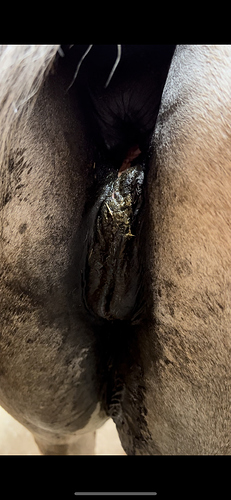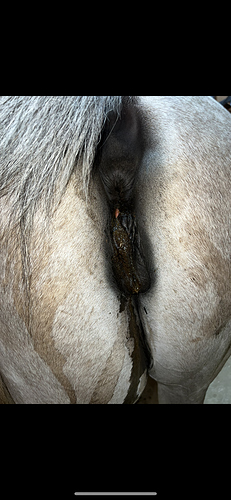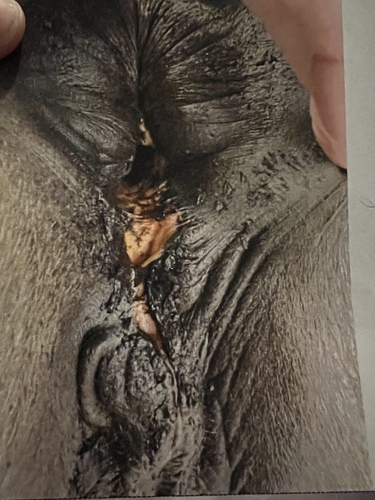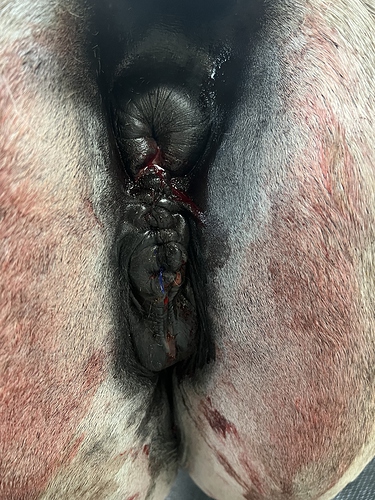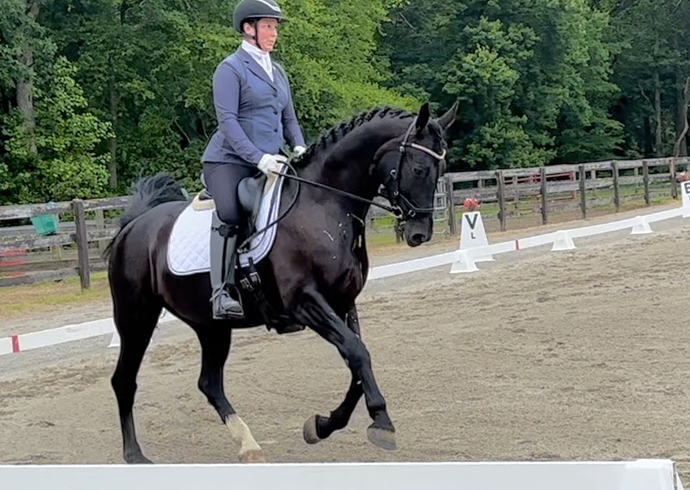I would be really interested to know what the blood draws test as well. I wasn’t aware of any blood tests that could assess where a mare was in her cycle - with mine, we were ultrasounding in order to do that. The only blood tests that ever came up specifically related to repro was to test for a GCT tumor (which we did, twice).
It’s to track her progesterone levels. Today will be the first blood draw and then we will draw every 7 days for a total of 4 samples. I’m also sending out a second GCT panel as well. Last one was a year ago and totally normal, but what’s a few more hundred bucks at this point!
We believe my mare went out of heat 10 days ago. She completely relaxed and was back to her old self. I was able to get on and walk her around without issue three times this week. I was overjoyed just to be able to walk away from the mounting block. Then today she started to act unsettle, by the time she came in from turnout she was screaming, high strung and cranky. She was wild on the lunge line. My trainer got on and was able to walk a little, but then she started to stop and pop up when asked to walk forward. We’re guessing she’s back in heat. Going to draw blood and ultrasound her tomorrow. I’ll reach out to the therio Monday and see where to go from here. I can’t have a horse that’s unmanageable and miserable 50% of the time.
Four days into the progesterone/estradiole protocol and I have a completely different horse. She was very reactive and tense when I rode on Friday. We started the shots on Saturday and she’s been her usual “summer self” since. She is not perfect, but she feels rideable/trainable again. We are cantering small jumps without drama, just feels like a horse who’s out of her program a bit.
Also a noticeable difference in grooming her: on Saturday I could curry her in front of her shoulder and behind her hip, but got grouchy faces/biting the air in betwen the two. The past 2 days she seems to even enjoy being curried in the no-no area.
Now I am more convinced that the ovaries and follicles are problematic, but I am also wondering if the Regumate is the problem. I don’t personally know anyone else who has had negative experiences, but the product literature says irritability and aggression are potential side effects. I guess I’ll find out next week when we finish our 10 days of shots, but I’m going to enjoy the relative peace they have created in the meantime 
Thanks for the update!
My vet has confirmed no residual fluid in my mares uterus. So hopefully the infection is gone. She took a culture from the uterus today just to be sure. I am going to inquire about trying the progesterone/estradiole once we get all our testing results back.
My mare’s uterine fluid is still culturing positive, with bacteria likely from feces. We’re switching gears and now looking into a full ovariohysterectomy. Due to her anatomy, she is going to be prone to repeat uterine infections. Not the news I wanted to hear. Much more intense surgery than an ovariectomy.
Yikes. I am no expert but could she have a caslicks done instead of surgery to see if it helps? I don’t know if that would be a permanent solution like surgery would be. The hormone treatment I’m doing with my mare is temporary but has been very helpful to give me a little greater degree of confidence that an ovariectomy may be the warranted.
I also wonder about putting in a caslicks instead of needing to remove the entire uterus. It can definitely be a permanent procedure, my mare had one put in at the track (likely when she was 3) and it wasn’t removed until she foaled at age 8. No reason that it could not be left in indefinitely.
We are discussing a castlick as an option, but the problem is we not only need to get her uterine infection under control, but also suppress estrus. Most drugs that suppress estrus are contraindicated in mares with chronic uterine infections since they cause the cervix to contract and suppress the uterus’s immune response.
So we have three issues. One being her perineal anatomy causing her to contaminate her uterus, two, her cervix that has adhesions and doesn’t allow the uterus to drain effectively and three, her intense heat cycles.
I will certainly try the least invasive options first, but also want to make sure my girl isn’t suffering. She is so miserable when in heat, which she is in 50% of the time.
Another update. After consulting with many specialists, we’ve decided to start with an ovariectomy and vulvaplasty. She goes to the clinic Monday and will likely have surgery Wednesday. At this point I really have no other option than to try this surgery. I can’t have her acting dangerously every 7-10 days when she goes into heat for another 7-10 days. I’m fully aware the surgery may not help with behavior or the infection, but I’ve got nothing to lose… expect money at this point. I just want my sweet, goofy, dumb and easy mare back  .
.
@lcbaker - hoping all the best with the outcome here. I’ve just gone through a week of nutty in-season behavior with my mare, and voila! my sweet, goofy, … mare is back. Hope you get this outcome. I hear your point about acting dangerously.
Jingles for your mare. It sounds really painful and miserable for her - I hope the surgery gives her (and you!) relief.
Thanks! Just left her at the clinic. I’m feeling confident that this is the appropriate course of action.
She had rectal and vaginal ultrasound as well as a vaginal scope and uterine flush. She’ll be getting an ovariectomy and perineal reconstruction tomorrow or Wednesday afternoon, depending on how much poop she clears out. Probably stay at the clinic until Sunday so they can get watch the perineal incision closely.
I gave her a big hug and soaked her coat with tears as I left. She just kept looking at me like, what’s wrong with you and why can’t I have hay!!
We’re one week post op. My mare came home from the clinic yesterday and so far so good! She had an ovariectomy and perineal reconstruction so hopefully no more infection and no more extreme heat cycles! She stayed at the clinic longer than normal for just an ovariectomy. They wanted to make sure her perineal repair help up after full reintroduction of food. Here are some pictures from the perineal procedure.
Before:
After:
A week of stall rest followed by a couple weeks of small paddock turnout and then slow reintroduction of work and full turnout.
I’m cautiously optimistic 
Just wanted to jump back here and give another update on my girl and her spay. I’m just two weeks past a year out from surgery and it’s been a crazy year!
Short version is all is amazing and my mare is going to be the horse she was always meant to be. Just got home from a show and she nailed two third level tests with scores of 69%. So her spay is a complete success!!
That said it hasn’t been easy and it hasn’t been smooth. She’s just finally found how to move in her “new body” the way she should after A YEAR!
A year of riding and retraining EVERYTHING I taught her. Long lining and ground work and treating her like she was a baby all over again.
Saddle shopping TWICE as her measurements changed four tree sizes… down.
I THINK the last thing is I am scoping her for ulcers this week. Reason is she had a very busy couple of weeks and I had her on ulcerguard and she was much calmer so I figured at this point why not check. It would make sense she has ulcers as she was in so much pain for 4 years and she would pain eat fast and angry and her food consumption is now down 50% so we are checking just to be sure.
I finally feel that we are over the hump and on a normal training schedule. I do just kick myself for all the time I wasted questioning this and letting her suffer as I chased symptom after symptom and listened to vets and other trainers tell me that some mares are just “difficult”.
Hopefully putting this out there helps other mares and their people.
Posting an update to this thread as my mare is almost exactly 6 months out from her ovariectomy… I am incredibly superstitious that I’m jinxing our success but here it is anyway: surgery was the right thing for my mare. She is still a forward thinking, sensitive, and sometimes spooky mare, but now she feels like she has more control of her emotions  I feel like we can ride and continue to train through things that in the past would have lead to complete unraveling. She’s also no longer a piranha to tack up, less grumpy about blanket changes and being groomed in general
I feel like we can ride and continue to train through things that in the past would have lead to complete unraveling. She’s also no longer a piranha to tack up, less grumpy about blanket changes and being groomed in general  .
.
I was really nervous to do the ovariectomy as there was no way to be 100% sure it was the right choice, and it could be an expensive way to find out it didn’t help anything - or made things worse. Extra weird is that my mare’s behavior was worst in the winter, which made it less intuitive to associate it with hormones and cycling. I had actually posted last winter about how my mare was just a misery to ride fall through spring every year. It’s been cold and dreary here for the past week and I have had some pretty decent rides, in the ring and hacking out. None of these rides would have been possible a year ago. Like all horses, our progress has not always been linear, but whenever I have felt down in the past few months, I remind myself that I was not even able to canter this horse earlier this year. I am incredibly grateful to @Guyot for sharing her experience, and to all the vets I talked with, many of whom I never met but were integral in helping me figure this all out. At least I’m no longer throwing money away on Regumate 
I’m so happy for you and your mare! Thank you for sharing your experience here 
Spurred on by another thread about a potentially hormonal mare I thought I’d post another and probably last update here on my mare.
Exactly two years post spay surgery my mare has been or returned to the quiet sweet relaxed horse I bought as an unbroke 4 year old.
Two huge changes in the last 6 months that made tremendous difference to her recovery was my emergency surgery that required me to take 6 weeks off and that break really helped. She was much more comfortable in her body and less tension and swishy tail. Although to some extent her swishy tail is a little who she is, it’s no longer agitated, if that makes sense.
The second huge change is my buying a laser blanket/neck and hood. While quite expensive it made such a change in her overall demeanor under saddle and in the barn it was shocking. Her sleep time increased and her overall body stance in the barn and turnout relaxed even more. I use it daily for 15 to 30 minutes, about 4 or more hours after her work session.
The last of her work that she was still stressing about; tempi changes and anything collected, piaffe/passage relaxed and came more like any other horses working thru the process of learning.
I hope this helps any other owner of a tough spooky difficult or dangerous horse (of which my mare was all of the above) to persevere and take time and empathy to let their horse find their way back to their body after this life changing surgery.
Ironically I just had another surgery myself… a hysterectomy; I have even more empathy as I have not had a smooth recovery. Three weeks out it has been very rough road for me and I wish I had given my mare more time then the vets said. They also told me two weeks recovery and back to work… yeah I’m still at home “on stall rest with hand walking” so since our surgeries were similar in hindsight I retuned her to work WAY to early.
Unfortunately this one does require the horse to stand on xties and be connected to a electric outlet and monitored.
We have another that works off batteries but is more expensive and doesn’t go as deep into the tissues and uses no heat. So pluses and minuses.
https://spectratherapy.com/product-category/shop-horse/
My mare prefers the thermotex even tho this time of year she sweats. I stand her in front of a huge fan and she gets a cool rinse after.

